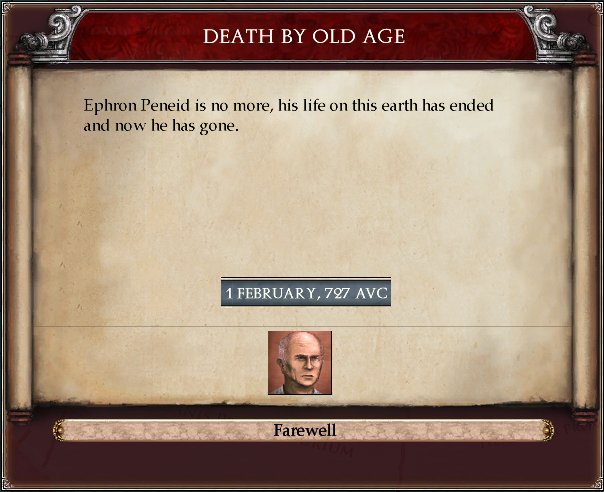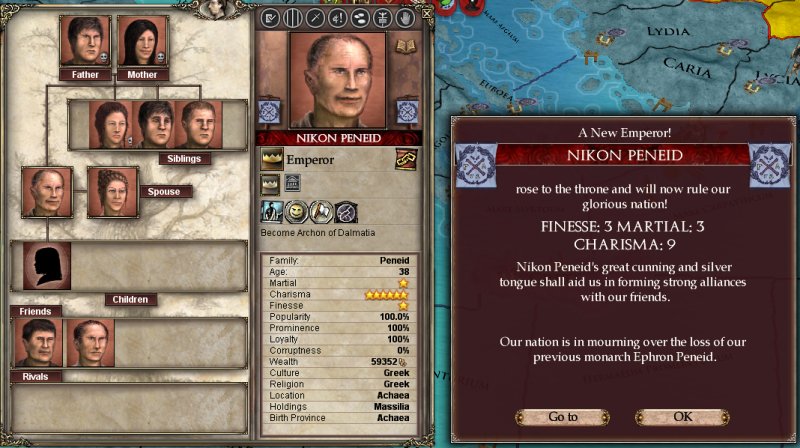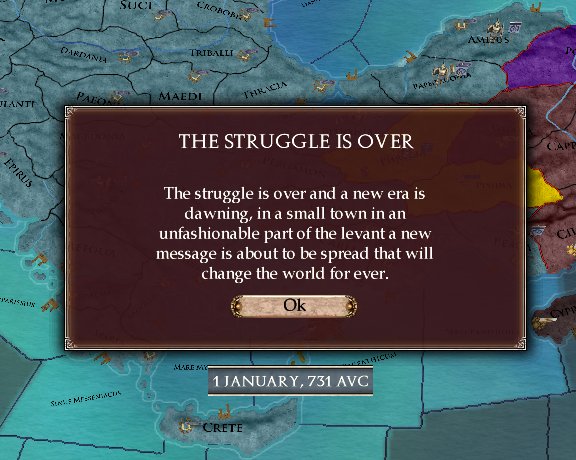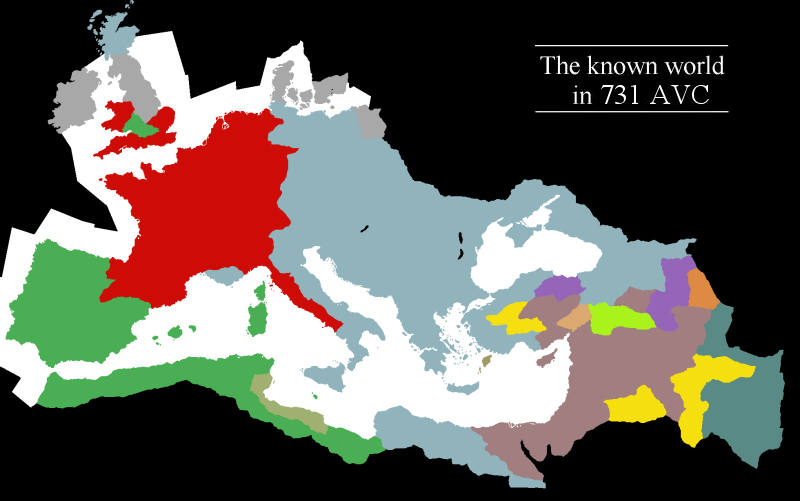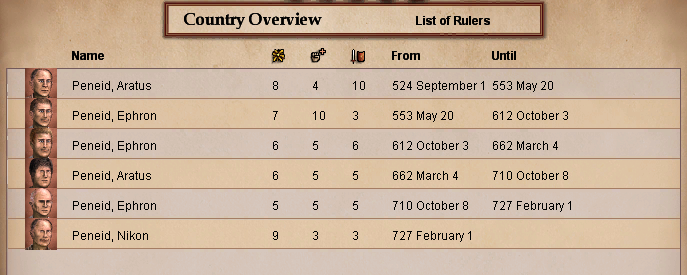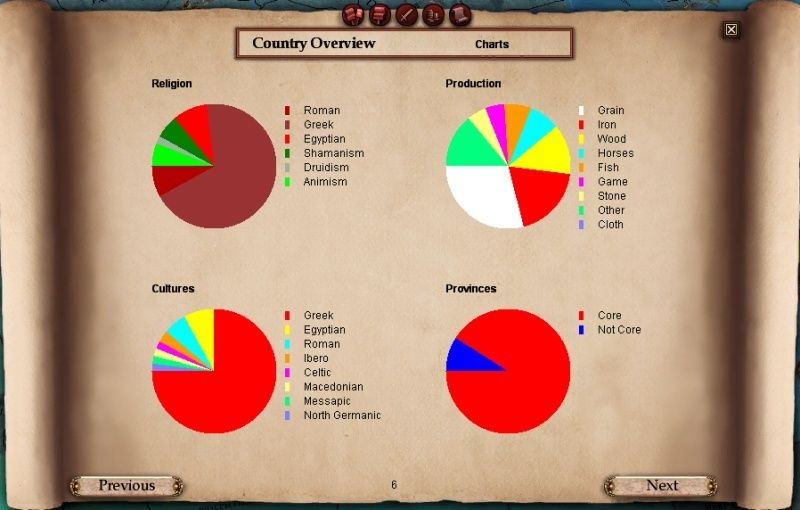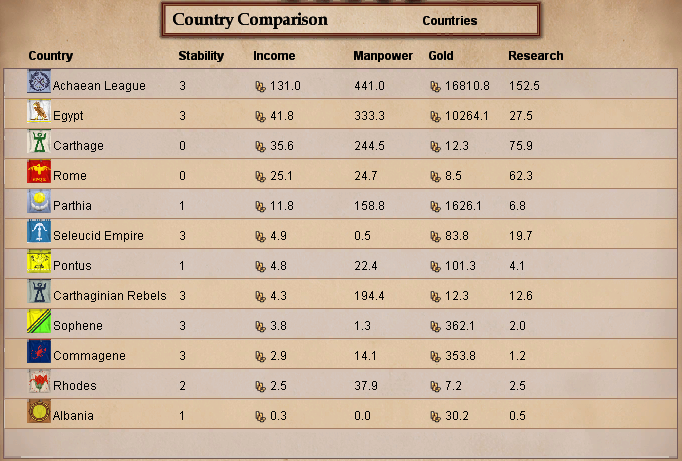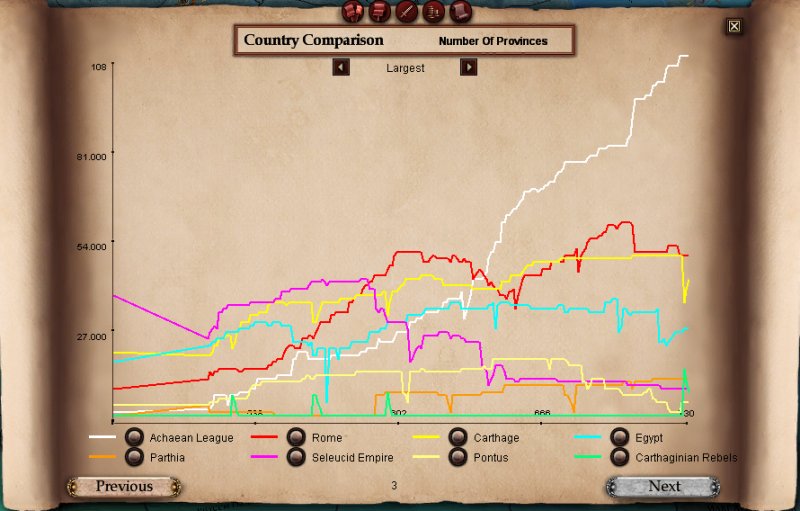XIV. The Imperialism of Ephron III
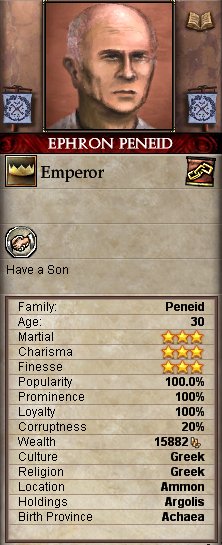
After the demise of Emperor Aratus II, the army agreed on the ascension of his 30-year old nephew, Ephron to the throne. Ephron III had not managed to distinguish himself until then, being markedly mediocre in everything he did, but he had not managed to make any enemies or any serious mistakes either. He was, in short, the most dependable candidate for seeing the continuation of the empire without getting any new and potentially destabilizing ideas into his head. He did have one outstanding trait, and that was his trustiness. That was how he came to accept Neoptolemus’ insistencies that he had nothing to do with his uncle’s death, and to keep him as governor of Dacia.
Soon after coming to power, though, Ephron began to explore new ideas that would begin to reshape his understanding of how the world works, and eventually the empire as a whole.
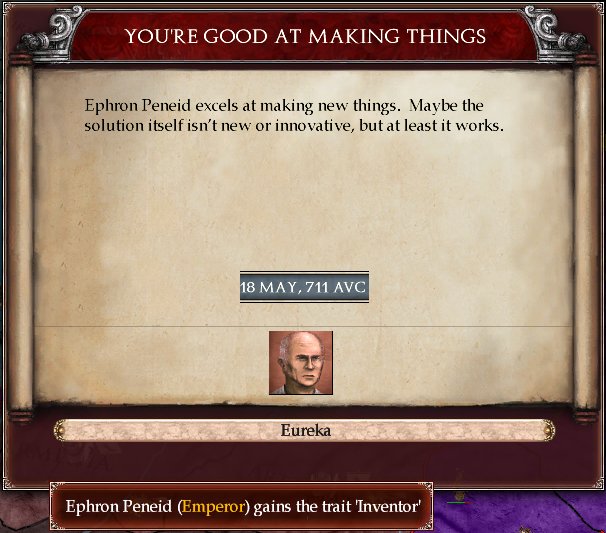
Having inherited a war against Pontus from his uncle, he was content to let his generals fight it, until Pontus’ submission in 713AVC.
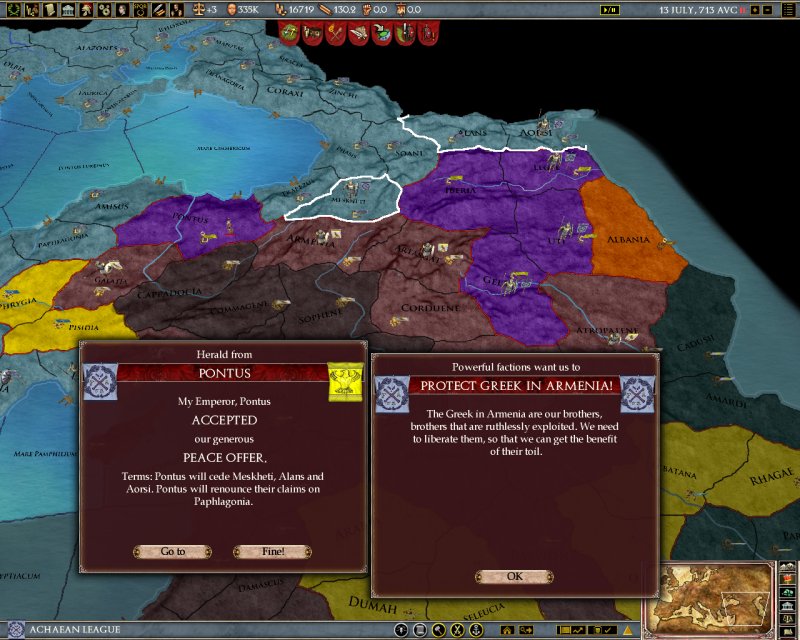
With those new gains, the Achaean Empire reached the shores of the Caspian Sea. Ephron would have been content to rule in peace after that, dedicating his energies to the material betterment of his people, but the very next year Egypt started a war with the Seleucid Empire, in defiance of Achaean guarantees. Rhodes, as usual, insisted that the Achaeans honour their commitment, and so Ephron agreed to yet another war on Egypt. This time, however, he took personal command of an army, as he had come to know that emperors who do not display acts of martial prowess quickly lose favour with the army and with the people. Commanding one of the smaller armies, operating in one of the quieter fronts, in Upper Egypt, he established himself as a confident commander.
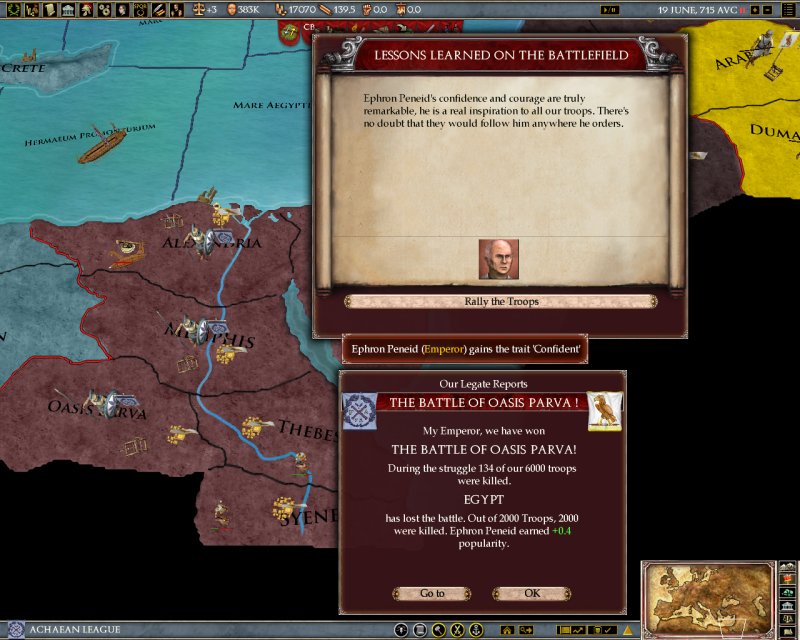
The following years saw continued successes against Egypt in the fields of battle, yet the Egyptians were able to secure concessions from both Pontus and the Seleucids, who were greatly pressed in their own territories.
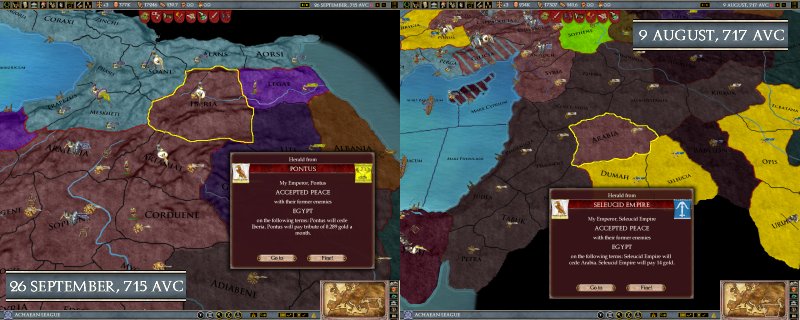
But those successes in the east could not make up for Egypt’s failures in the west, and soon a pretender to the throne launched a civil war that wracked the country. The Achaeans fought both sides, and were able to make separate peace treaties, to their great advantage.
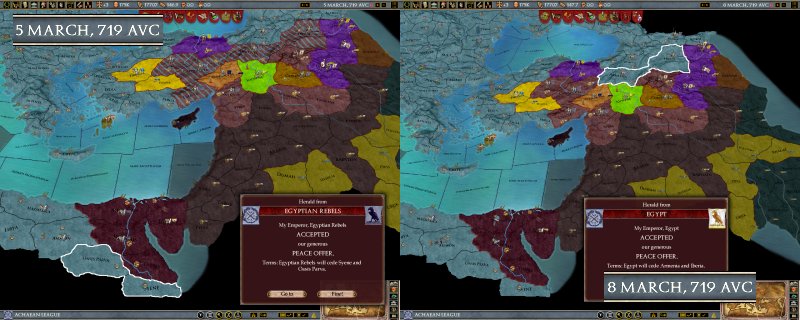
The end of the war, in 719AVC, saw Achaean gains in the Caucasus and Upper Egypt. In addition, three new independent states had sprung up from the chaos of the Egyptian civil war, which Ephron quickly guaranteed and showered with gifts. With the civil war still raging, Egypt was left in an unenviable position, as it was all too clear that it had permanently lost the fight for supremacy against the Achaean Empire.
With the Achaean borders safe, and succumbing to a sudden desire to learn more about the distant north, Ephron commissioned a military expedition to Caledonia, which soon established Achaean control over the north of Britania. The Achaean Empire thus became the third great power with holdings on the island, and Ephron made it clear that it would be interested in the affairs of the independent tribes there. That was how, when the Roman Senate declared war on the Orismii tribe of Cornwall, the Achaean Empire had a casus belli to attack Rome.
After meticulous preparations and movements of armies, the declaration of war was delivered on 25 April 721AVC. Immediately, the Achaeans attacked with overwhelming force all across the border.
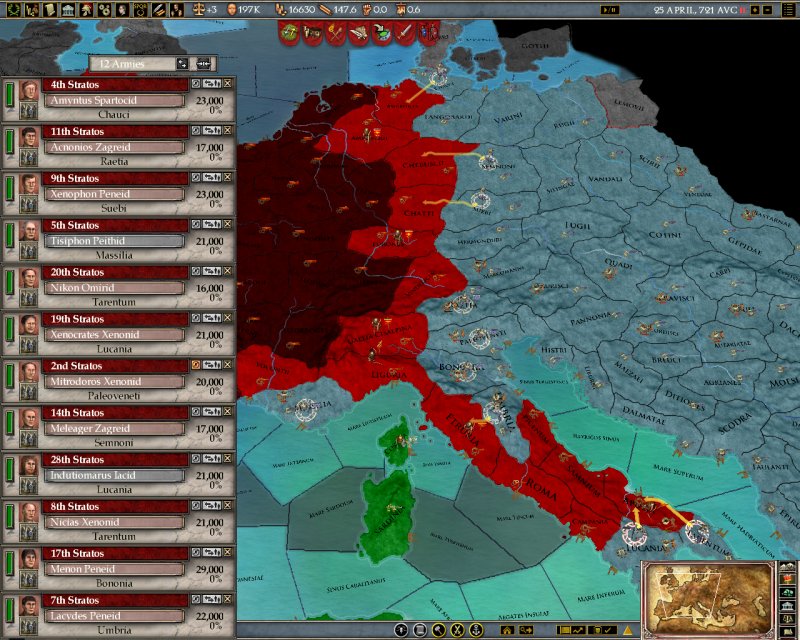
That the war lasted four years was solely a factor of the resistance put up by the many walled cities of the Roman republic, as their armies put up only token resistance. Carthage declared its own war, a few days after the Achaeans, but although it was victorious it was curiously content to make peace for only a small indemnity in gold; possibly because the rapid advance of the Achaean armies meant that there was little territory the Carthaginians could occupy, to use as leverage in a peace treaty, and there were few Roman armies to defeat in battle.
Meanwhile, the loyalists in Egypt retook Alexandria, limiting the rebels to possession of Cyprus, but the Egyptian throne had been shaken irreparably. With the death of the old pharaoh, a three-year-old girl was said to rule from the new capital, in Mygdonia.
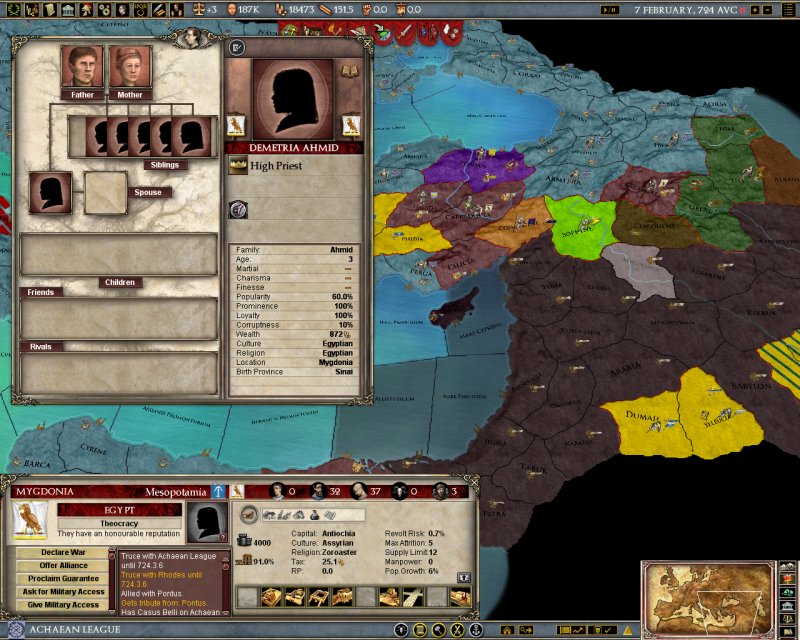
When the Roman Senate finally conceded its defeat, in 725AVC, it granted strategic concessions to the Achaeans in Italy. The Adriatic became an Achaean sea, and its provinces in Magna Graecia and Sicily became linked by land to the rest of the empire.
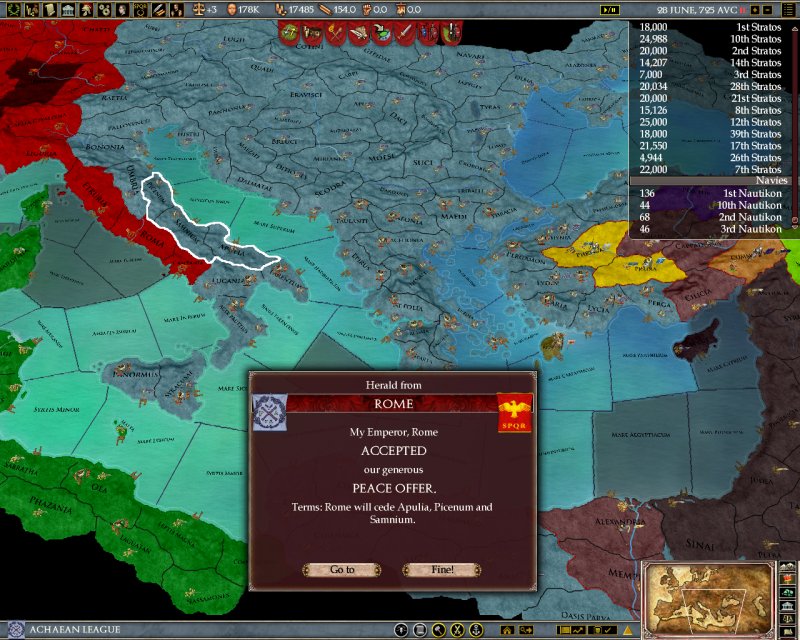

After the demise of Emperor Aratus II, the army agreed on the ascension of his 30-year old nephew, Ephron to the throne. Ephron III had not managed to distinguish himself until then, being markedly mediocre in everything he did, but he had not managed to make any enemies or any serious mistakes either. He was, in short, the most dependable candidate for seeing the continuation of the empire without getting any new and potentially destabilizing ideas into his head. He did have one outstanding trait, and that was his trustiness. That was how he came to accept Neoptolemus’ insistencies that he had nothing to do with his uncle’s death, and to keep him as governor of Dacia.
Soon after coming to power, though, Ephron began to explore new ideas that would begin to reshape his understanding of how the world works, and eventually the empire as a whole.

Having inherited a war against Pontus from his uncle, he was content to let his generals fight it, until Pontus’ submission in 713AVC.

With those new gains, the Achaean Empire reached the shores of the Caspian Sea. Ephron would have been content to rule in peace after that, dedicating his energies to the material betterment of his people, but the very next year Egypt started a war with the Seleucid Empire, in defiance of Achaean guarantees. Rhodes, as usual, insisted that the Achaeans honour their commitment, and so Ephron agreed to yet another war on Egypt. This time, however, he took personal command of an army, as he had come to know that emperors who do not display acts of martial prowess quickly lose favour with the army and with the people. Commanding one of the smaller armies, operating in one of the quieter fronts, in Upper Egypt, he established himself as a confident commander.

The following years saw continued successes against Egypt in the fields of battle, yet the Egyptians were able to secure concessions from both Pontus and the Seleucids, who were greatly pressed in their own territories.

But those successes in the east could not make up for Egypt’s failures in the west, and soon a pretender to the throne launched a civil war that wracked the country. The Achaeans fought both sides, and were able to make separate peace treaties, to their great advantage.

The end of the war, in 719AVC, saw Achaean gains in the Caucasus and Upper Egypt. In addition, three new independent states had sprung up from the chaos of the Egyptian civil war, which Ephron quickly guaranteed and showered with gifts. With the civil war still raging, Egypt was left in an unenviable position, as it was all too clear that it had permanently lost the fight for supremacy against the Achaean Empire.
With the Achaean borders safe, and succumbing to a sudden desire to learn more about the distant north, Ephron commissioned a military expedition to Caledonia, which soon established Achaean control over the north of Britania. The Achaean Empire thus became the third great power with holdings on the island, and Ephron made it clear that it would be interested in the affairs of the independent tribes there. That was how, when the Roman Senate declared war on the Orismii tribe of Cornwall, the Achaean Empire had a casus belli to attack Rome.
After meticulous preparations and movements of armies, the declaration of war was delivered on 25 April 721AVC. Immediately, the Achaeans attacked with overwhelming force all across the border.

That the war lasted four years was solely a factor of the resistance put up by the many walled cities of the Roman republic, as their armies put up only token resistance. Carthage declared its own war, a few days after the Achaeans, but although it was victorious it was curiously content to make peace for only a small indemnity in gold; possibly because the rapid advance of the Achaean armies meant that there was little territory the Carthaginians could occupy, to use as leverage in a peace treaty, and there were few Roman armies to defeat in battle.
Meanwhile, the loyalists in Egypt retook Alexandria, limiting the rebels to possession of Cyprus, but the Egyptian throne had been shaken irreparably. With the death of the old pharaoh, a three-year-old girl was said to rule from the new capital, in Mygdonia.

When the Roman Senate finally conceded its defeat, in 725AVC, it granted strategic concessions to the Achaeans in Italy. The Adriatic became an Achaean sea, and its provinces in Magna Graecia and Sicily became linked by land to the rest of the empire.



